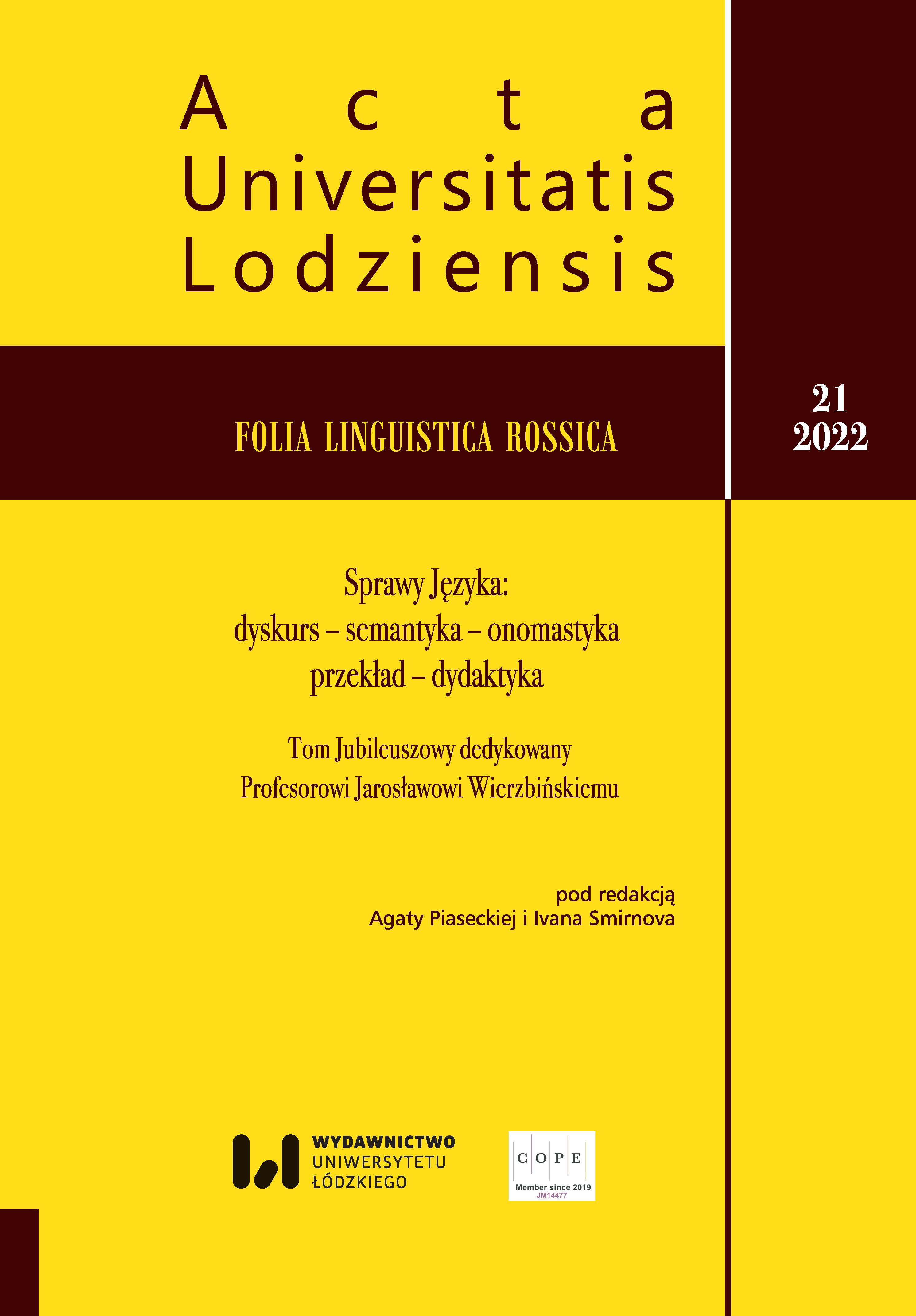Spatiality as a Semantic and Grammatical Feature of the Russian Language in Comparison with Bulgarian
DOI:
https://doi.org/10.18778/1731-8025.21.07Keywords:
Russian, Bulgarian, spatiality, semantic-grammatical dominant, grammatical conceptualizationAbstract
The article deals with the linguistic conceptualization of space in the Russian language. The relevance of the article is due to the importance of studying the specific features of the Russian language.
The aim of the article is to trace the degree of expressiveness of locality in comparison with the Bulgarian language. The material used comes from the National Corpus of the Russian language, the Bulgarian National Corpus, translated texts, and dictionaries. Spatiality in the Russian language is considered a semantic-grammatical dominant, revealed at different linguistic levels.
The study uses systemic, comparative, and functional methods. The effectiveness and relevance of the named methods is connected with the possibility to present the specific features of the Russian language in the expression of spatiality in a comprehensive approach, to show this category as a semantic-grammatical dominant of the Russian language, which is manifested both in the language system at different levels, and in speech. Its more explicit manifestation in comparison with the Bulgarian language is traced in the comparative analysis at the levels of phraseology, grammar, and text.
It is demonstrated that the Russian language in the totality of its expressive means draws attention to the spatial picture of the world with maximum explication and detailing of real object-spatial relations contained in the situation. The differences in the linguistic interpretation of space, revealed in the Russian and Bulgarian material, are due to both extra-linguistic and linguistic factors – the peculiarities of the system properties of the languages, their lexico-grammatical resources, and typological characteristics.
The significance of the study for the theory and practice of teaching Russian as a foreign language is noted.
References
Апресян, Ю.Д. (1995). Интегральное описание языка и системная лексикография. В: Ю.Д. Апресян. Избранные труды. Том 2. Москва: Языки русской культуры.
Google Scholar
Арутюнова, Н.Д. (1976). Предложение и его смысл: логико-семантические проблемы. Москва: Наука.
Google Scholar
аспекты. Mосква: «Школа русской культуры».
Google Scholar
Български национален корпус, http://www.search.dcl.bas.bg, доступ: 11.02.2022.
Google Scholar
Влахов, С. (1980). Русско-болгарский фразеологический словарь. Москва: Русский язык; София: Наука и изкуство.
Google Scholar
Карпенко, Л.Б. (1984). Способы выражения локальности в русском и болгарском языках, Съпоставително езикознание, 1, 20–28.
Google Scholar
Карпенко, Л.Б. (1988). Соотношение предлогов горизонтальной ориентации в русском и болгарском языках, Съпоставително езикознание, 6, 13–17.
Google Scholar
Национальный корпус русского языка, http://www.ruskorpora.ru, доступ: 28.12.2022.
Google Scholar
Телия, В.Н. (1996). Русская фразеология. Семантический, прагматический и лингвокультуро-логический аспекты. Mосква: «Школа русской культуры».
Google Scholar
Уорф, Б (1960). Наука и языкознание, Новое в лингвистике, 1, 169–182.
Google Scholar
Эверетт, Д.Л. (2016). Не спи – кругом змеи! Быт и язык индейцев амазонских джунглей. Сост. А.Д. Кошелев. Москва: Издательский Дом ЯСК.
Google Scholar
Humboldt, W. (2019). Linguistic Variability and Intellectual Development. University of Pennsylvania Press.
Google Scholar
Sapir, E. (1921). An Introduction to the Study of Speech. New York: Harcourt, Brace.
Google Scholar
Arutyunova, N.D. (1976). Predlozhenie i ego smysl: logiko-semanticheskie problemy. Moscow: Nauka.
Google Scholar
B”lgarski natsionalen korpus, http://www.search.dcl.bas.bg accessed: 11.02.2022.
Google Scholar
Everett, D.L. (2016). Ne spi – krugom zmei! Byt i yazyk indeitsev amazonskikh dzhunglei. Sost. A.D. Koshelev. Moscow: Izdatel’skii Dom YaSK.
Google Scholar
Humboldt, W. (2019). Linguistic Variability and Intellectual Development. University of Pennsylvania Press.
Google Scholar
Karpenko, L.B. (1984). Sposoby vyrazheniya lokal’nosti v russkom i bolgarskom yazykakh, S”postavitelno ezikoznanie, 1, 20–28.
Google Scholar
Karpenko, L.B. (1988). Sootnoshenie predlogov gorizontal’noi orientatsii v russkom i bolgarskom yazykakh, S”postavitelno ezikoznanie, 6, 13–17.
Google Scholar
Natsional’nyi korpus russkogo yazyka, http://www.ruskorpora.ru, accessed: 28.12.2022.
Google Scholar
Sapir, E. (1921). An Introduction to the Study of Speech. New York: Harcourt, Brace.
Google Scholar
Teliya, V.N. (1996). Russkaya frazeologiya. Semanticheskii, pragmaticheskii i lingvokul’turologicheskii aspekty. Moscow: Shkola «Yazyki russkoi kul’tury».
Google Scholar
Uorf, B. (1960). Nauka i yazykoznanie, Novoe v lingvistike, 1, 169–182, https://doi.org/10.3406/bude.1960.3893
Google Scholar
DOI: https://doi.org/10.3406/bude.1960.3893
Vlakhov, S. (1980). Russko-bolgarskii frazeologicheskii slovar’. Moscow: Russkii yazyk; Sofiya: Nauka i izkustvo.
Google Scholar
Downloads
Published
How to Cite
Issue
Section
License

This work is licensed under a Creative Commons Attribution-NonCommercial-NoDerivatives 4.0 International License.









